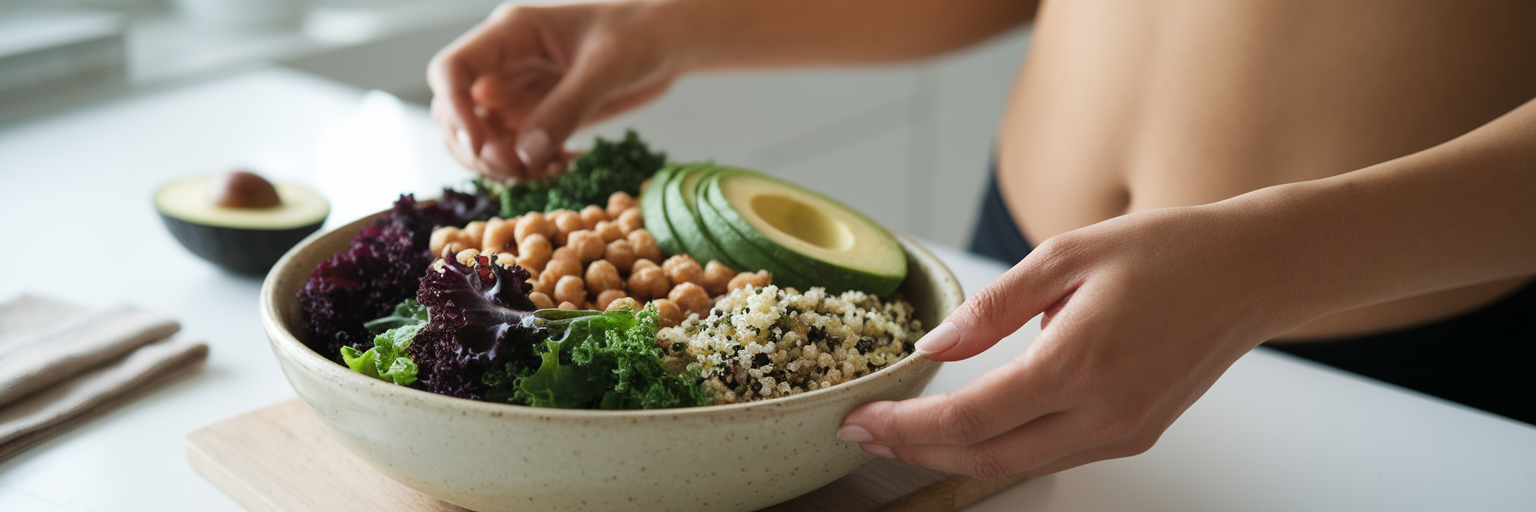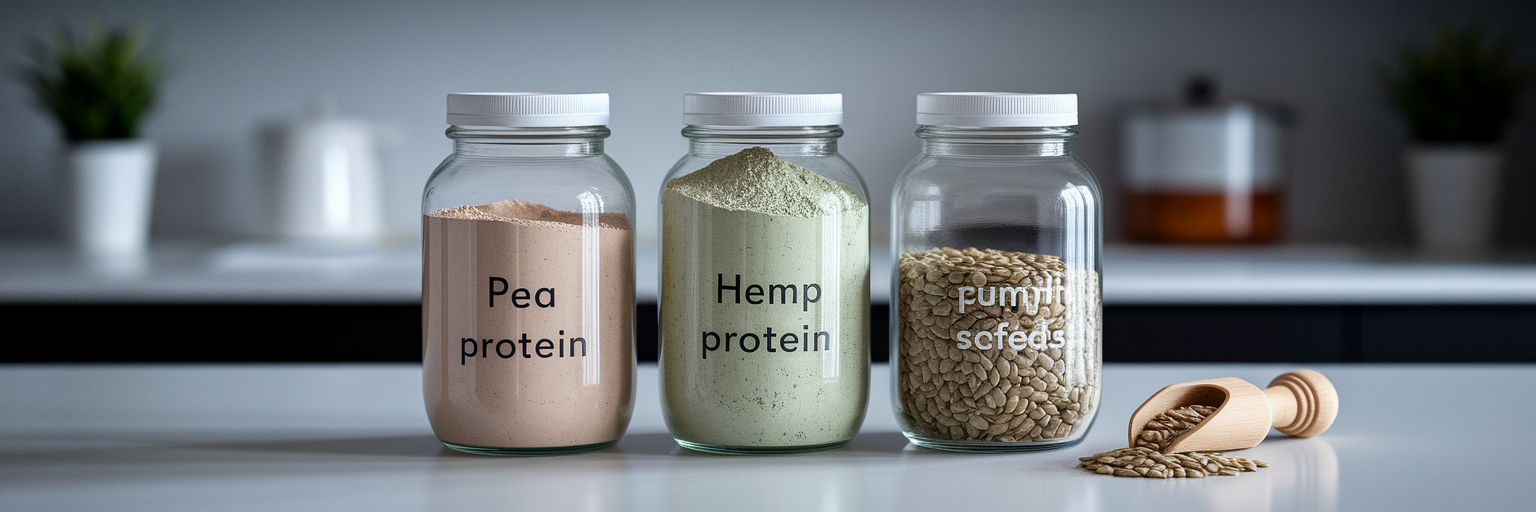The Foundational Link Between Protein and Hormones
Have you ever felt like you're doing everything right? You’re consistent with your workouts, you’re eating clean, but you still feel off. Maybe it’s a lingering fatigue that coffee can’t fix, stubborn weight that won’t budge, or just a general sense of being out of sync. It’s a frustrating feeling, and it often points to something deeper than just calories or gym sessions. These could be signs of hormonal imbalance women often overlook.
Think of your hormones as your body's internal messaging system. They are the memos sent from headquarters that tell every single department, from your metabolism to your mood, exactly what to do and when. For this system to work, it needs the right raw materials. That’s where protein comes in. The amino acids from the protein you eat are the building blocks for many of these crucial hormonal messages.
Key hormones that regulate your metabolism, appetite, and stress response, like insulin and cortisol, depend on a steady supply of these amino acids. When you don't get enough protein, it’s like trying to run a company with a faulty email server. Messages get delayed, misinterpreted, or never sent at all.
Adequate protein intake also plays a vital role in stabilizing your blood sugar. A protein-rich meal prevents the sharp spikes and crashes in blood sugar that can send your insulin and cortisol levels on a rollercoaster. When these are stable, your other hormones, including your sex hormones, can function much more effectively. It’s the foundation upon which hormonal harmony is built.
Why Plant-Based Protein Is a Game-Changer for Women

While all protein is fundamental, choosing plant-based sources offers unique advantages that are especially beneficial for female wellness. It’s not just about meeting your daily protein quota. It’s about giving your body a multi-tool that supports hormonal health from several different angles. A diet centered around plant based protein for women can create a profound shift in how you feel.
The Power of Phytoestrogens
Certain plant foods, like soy and flaxseed, contain compounds called phytoestrogens. Don't let the name intimidate you. Think of them as gentle hormone modulators. They have a structure similar to the body's own estrogen but are much weaker. When your estrogen levels are high, they can occupy estrogen receptors, blocking the effects of the stronger, natural estrogen. When your levels are low, they can provide a mild estrogenic effect. This buffering action can help ease the fluctuations that contribute to PMS and perimenopausal symptoms.
Gut Health and Hormone Detox
One of the most overlooked aspects of hormonal balance is your gut. Your gut microbiome is responsible for metabolizing and eliminating excess hormones from your body, particularly estrogen. Plant proteins are naturally rich in fiber, which is the preferred food for your beneficial gut microbes. A high-fiber diet keeps your digestive system running smoothly and ensures that used-up hormones are efficiently escorted out, preventing them from recirculating and causing issues.
Taming Inflammation Naturally
Chronic inflammation is a major disruptor of hormonal signaling. It creates static in your body’s communication lines, making it harder for hormones to do their jobs correctly. Many plant-based foods are packed with antioxidants and anti-inflammatory compounds. By choosing from the wide variety of our plant-based proteins, you help create a calmer, less inflamed internal environment, allowing your hormonal system to function in harmony.
Essential Micronutrients for Hormonal Harmony
A scoop of vegan protein powder or a meal rich in lentils does more than just provide amino acids. It delivers a host of essential micronutrients that act as "helpers" for your endocrine system. These vitamins and minerals are the unsung heroes of hormonal health, and many are abundant in the very foods that form the basis of a plant-rich diet. Including these hormone balancing foods for women is a direct way to support your body's natural rhythms.
Magnesium: The Calming Mineral
Magnesium is often called the "calming mineral" for good reason. It plays a critical role in regulating the nervous system and managing the body's stress response by helping to keep the stress hormone cortisol in check. When you’re stressed, your body uses up magnesium more quickly, so replenishing it is key. You can find it in leafy greens like spinach, nuts, and seeds, especially hemp and pumpkin seeds.
Zinc: The Thyroid and Fertility Supporter
Zinc is a powerhouse mineral for female health. It’s essential for proper thyroid function, which governs your metabolism, and it’s also vital for the production of sex hormones and healthy ovulation. As noted by health experts at the National Institutes of Health, zinc is fundamental for reproductive health and hormone synthesis. Great plant-based sources include lentils, chickpeas, and pumpkin seeds.
Iron: The Energy and Stress Shield
For active women, iron is non-negotiable. It’s a core component of hemoglobin, which transports oxygen to your muscles and brain. Low iron levels lead to fatigue, brain fog, and a reduced capacity to handle physical stress. This state of exhaustion can put a strain on your adrenal glands and disrupt your entire endocrine system. Plant sources like lentils, spinach, and tofu are excellent for keeping your iron stores up.
B Vitamins: The Mood and Adrenal Boosters
The B-vitamin family, especially vitamin B6, acts as a critical cofactor in the production of neurotransmitters like serotonin and dopamine. These are your "feel-good" brain chemicals that influence mood and motivation. Healthy levels can help ease the mood swings associated with PMS. B vitamins also support your adrenal glands, which are central to your stress response. You can find them in chickpeas, nutritional yeast, and avocados.
Choosing the Right Vegan Protein for Your Body

Walking down the supplement aisle or browsing online can feel overwhelming. Pea, hemp, soy, rice… what’s the difference? Finding the best vegan protein powder women can feel like a challenge, but it’s simpler than it looks. The key is to match the protein type to your specific goals and body.
Here’s a quick breakdown of the most common options:
| Protein Type | Key Benefit | Best For... | Considerations |
|---|---|---|---|
| Pea Protein | Rich in BCAAs for muscle repair | Post-workout recovery and building lean muscle | Can have a slightly earthy taste |
| Hemp Protein | Contains fiber and omega-3s | Supporting overall wellness and gut health | Lower protein content per serving than pea |
| Soy Protein | Complete amino acid profile | Women seeking phytoestrogen benefits | Choose non-GMO; potential allergen for some |
| Brown Rice Protein | Hypoallergenic and easy to digest | Those with sensitive stomachs or allergies | Can be slightly gritty in texture |
Note: This table provides a general comparison to help guide your choice. The best protein for you depends on your individual fitness goals, dietary needs, and taste preferences.
When you’re reading labels, here’s what to look for:
- Third-Party Testing: This ensures the product is free from heavy metals and contaminants.
- Minimal Added Sugars: Look for powders sweetened naturally with stevia or monk fruit, or choose an unflavored version to control the sweetness yourself.
- A Complete Amino Acid Profile: Many of the best protein powders use a blend of sources, like pea and rice, to ensure you get all the essential amino acids.
And don’t worry about the old myth that you can’t get "complete protein" from plants. Eating a variety of plant-based foods throughout the day provides your body with all the amino acids it needs to thrive.
Simple Ways to Integrate Vegan Protein Into Your Day
The secret to consistently hitting your protein goals for hormonal health is to make it easy and delicious. Thinking beyond the post-workout shake can transform your protein powder from a supplement into a versatile kitchen staple. A holistic approach using both powders and whole foods is the most effective strategy for vegan protein for hormonal balance.
Here are a few simple ideas to get you started:
- Boost Your Breakfast: Stir a scoop of vanilla or unflavored protein powder into your morning oatmeal or yogurt bowl. You can also add it to pancake or waffle batter for a protein-packed start to your day.
- Supercharge Your Smoothies: This is a classic for a reason. A simple template makes it foolproof: 1 scoop of protein, 1 cup of plant milk, a large handful of spinach, ½ cup of berries, and 1 tablespoon of chia or flax seeds.
- Make Soups Creamier: Add a scoop of unflavored protein powder to blended vegetable soups, like butternut squash or tomato, to make them thicker, creamier, and more satisfying.
- Create Healthy Snacks: Mix protein powder into no-bake energy balls with oats, nut butter, and a little maple syrup for a perfect afternoon pick-me-up.
Remember to also build your meals around whole-food protein sources like lentils, chickpeas, tofu, and quinoa. If you need some inspiration, check out these easy vegan protein recipes you'll actually crave. A scoop of our Chocolate Vegan Protein can turn a simple smoothie into a decadent, muscle-repairing treat.
How do you use vegan protein to support your fitness goals? Share your favorite recipes or tips in the comments below!



